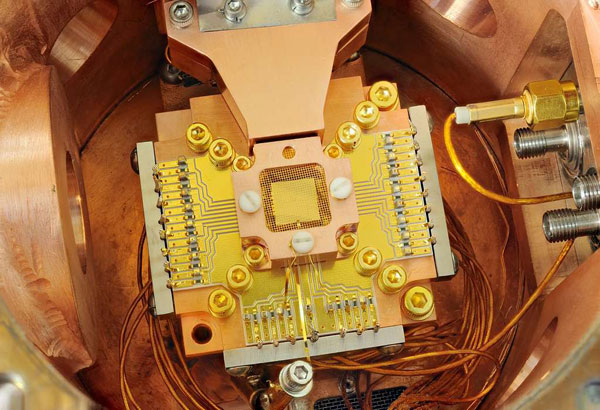Microsoft and Google revealed their own quantum computing chips

[Photo Credit to Wikimedia]
On February 19, Microsoft revealed its quantum computing chip, Majorana 1.
This chip was developed using topological superconductors, which rely on topological qubits, which are highly resistant to environmental disturbances.
Majorana 1 aims to tackle the error issues that have weakened quantum computers, enabling more stable and reliable computations.
Microsoft asserts that Majorana 1 has the potential to accelerate the commercialisation of quantum computers by decades.
The word quantum computing could be unfamiliar and overwhelming to many people since the words quantum and computer make it seem like something complex.
Bits utilized in traditional computers can only represent one state, 0 or 1, at a time to process data.
Quantum computers, on the other hand, use qubits (quantum bits) which can exist in a superposition state, allowing them to represent both 0 and 1 simultaneously.
For example, eight classical bits can only represent one state at a time, eight qubits can represent 28 (256) states simultaneously at the same time.
As the number of qubits increases, their computational power grows exponentially, enabling them to perform calculations in a fraction of the time that would take classical computers billions of years to complete.
However, quantum computers are currently highly sensitive to external conditions, making them prone to errors during computation.
To mitigate this, researchers are developing quantum error correction techniques.
Effectively resolving these issues will be crucial in significantly enhancing the practicality of quantum computing.
Currently, each Majorana 1 chip contains just eight qubits, however, Microsoft has announced plans to scale this up to one million qubits per chip.
Quantum computers are expected to revolutionize fields like medicine and advanced materials, ultimately improving our quality of life.
Recently, Google introduced its new quantum computing chip, Willow.
Google claims that Willow can perform calculations in five minutes that would take the world’s most powerful supercomputer 1025 years to complete.
It also demonstrated a high error correction rate, making it a significant advancement toward practical quantum computing.
However, the advent of quantum computers does not mean that classical computers will be only found in museums.
Instead, quantum computers and classical computers have different strengths and will complement each other in various domains.
Quantum computers will excel in solving specific highly complex problems that classical computers struggle with, such as AI as they remove limits in data size, and peed.
As the demand for quantum computing technology rapidly expands, major tech companies like IBM, Intel, and Amazon are investing in quantum computing.
IBM is working towards developing quantum processors with over 1,000 qubits, while Intel is working on silicon-based qubits using conventional semiconductor manufacturing techniques.
Quantum computers could also be instrumental in solving protein-folding problems, which are critical in medical research.
In finance and cryptography, quantum computing is most likely to bring both challenges and opportunities.
Quantum computers could quickly break traditional RSA encryption which is a security risk.
Despite these strengths, significant challenges remain before quantum computers become widely practical.
Reducing qubit error rates and improving qubit stability are crucial steps.
Microsoft’s Majorana 1 and Google’s Willow are significant footsteps in addressing these issues.
The future of quantum computing hinges on how swiftly these technologies can be refined and applied to real-world problems.

- Chaemoon Han / Grade 10
- American School Dhahran

![THE HERALD STUDENT REPORTERS [US]](/assets/images/logo_student_us.png)
![THE HERALD STUDENT REPORTERS [Canada]](/assets/images/logo_student_ca.png)
